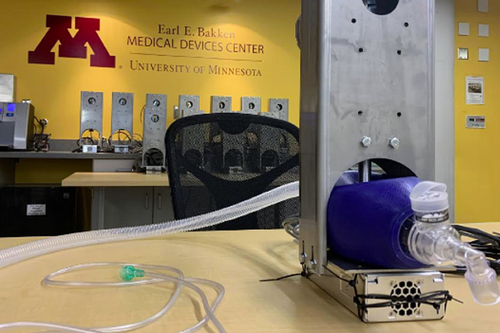FDA authorizes first-of-its-kind, low-cost ventilator developed by University of Minnesota

The U.S. Food and Drug Administration (FDA) today authorized the production and use of a low-cost ventilator first conceived by a team of University of Minnesota researchers and an alumnus. Known as the Coventor, this ventilator is the first-of-its-kind authorized for use under the FDA's Emergency Use Authorization for the COVID-19 outbreak.
“Our hope is that the Coventor will be useful in those clinical settings where traditional ventilators are not available. With FDA authorization, we are closer to that happening,” said Stephen Richardson, a cardiac anesthesiology fellow in the Medical School, M Health Fairview.
Ventilators are used in a clinical setting to assist patients with increasing their blood oxygen levels. They have become a critical treatment device for COVID-19 and were used previously to support patients with pneumonia and acute respiratory distress. Ventilators are in short supply nationwide as hospitals respond to the COVID-19 pandemic.
Richardson and a U of M research team developed and designed the Coventor, a low-cost backup alternative for physicians to use. Financial and in-kind support for this initiative has been provided by Midwest companies Digi-Key, MGC Diagnostics and Protolabs, and Teknic, Inc. from New York.
Working with an interdisciplinary University team, Richardson and fellow inventor, Aaron Tucker, adapted their initial prototype from an assortment of available machinery components to a custom slider-crank mechanism which allows medical staff to control how oxygen is delivered to patients. The Coventor is compact — table top/desktop size — and relatively inexpensive to manufacture and distribute.
“Because of its ease, simplicity and cost, we believe this concept can be scaled in many different designs,” said Tucker, a lab supervisor at the Earl E. Bakken Medical Devices Center and graduate student in the College for Science and Engineering (CSE).
With FDA authorization, the design can move forward with production and distribution to health care systems. Support from design partner and manufacturer Boston Scientific and input from Medtronic have been helpful through the FDA process. This research was funded by the Rapid Response Grants from the U of M Office of Academic Clinical Affairs and comprises a team from Earl E. Bakken Medical Devices Center, CSE and the Medical School.
University researchers announced today that the Coventor’s specification will be made open source so other manufacturers globally can begin their regulatory and production processes.
“This allows patients who wouldn’t otherwise have the opportunity to survive, to survive,” Richardson said. “The Coventor gives people a chance and that is what this is all about. Making the ventilator as fast as possible, pushing it to people everywhere.”
To learn more about the Coventor, visit med.umn.edu/covid19Ventilator.




